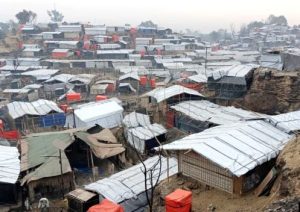Rohingya genocide day marked
The Rohingya people have marked the seven-year anniversary of the genocide that sparked the exodus of hundreds of thousands of them from Myanmar.
In August 2017, Myanmar’s military, the Tatmadaw, unleashed waves of violence against Rohingya ethnic minorities in Rakhine State.
The conflict triggered the exodus of more than 700,000 Rohingya into neighbouring Bangladesh, marking the largest and fastest influx into the country.
The UN later concluded the attacks constituted genocide and crimes against humanity.
 The Rohingya who stayed in Myanmar following the attacks continue to face violence at the hands of the Tatmadaw.
The Rohingya who stayed in Myanmar following the attacks continue to face violence at the hands of the Tatmadaw.
They are suffering poverty, rights abuses, discrimination, and exposure to armed conflict.
The Rohingya also face restrictions on their movement, limited access to essential services, and deep-seated prejudice based on their ethnicity and religion.
Melbourne-based Rohingya community leader Majid Abdul said the situation for the Rohingya in Rakhine state has gotten worse since the exodus.
“I am very concerned and heartbroken with the recent attacks against the Rohingya community especially in my homeland,” Mr Abdul said.
“I have also heard from my family, friends, and community members about the wholesale destruction of villages. We need the world to pay attention. We need the United States and other countries with influence to speak out, pressure those targeting the Rohingya, and ensure that those fleeing are provided refuge.
“Only humanitarian aid and protection can save the remaining members of the community. Rohingya refugees are fleeing to save their lives. They want to return to their homes in safety and dignity. But, as we mark another Rohingya Genocide Remembrance Day, it is not safe for the Rohingya to return home,’ he said.
The seven-year anniversary comes amid intensifying fighting in Rakhine State, with the Military and Arakan Army battling to control territory.
Meanwhile, Rohingya and other civilians are caught between the warring parties with devastating consequences. Indiscriminate attacks against civilians, arson and looting of civilian property, killings, and forced recruitment by both sides of the conflict continue to occur.
In Bangladesh, many Rohingya live in impoverished conditions, often in makeshift shelters that have inadequate sanitation and are unable to withstand extreme weather.
Rohingya have limited access to healthcare, and even to seek medical treatment, they must obtain permission to leave their communities.
They are also denied access to education, employment, and livelihood opportunities, which compounds the hardship they face and prevents them from moving out of poverty.
UNHCR, the UN Refugee Agency, has called for sustained commitment from international partners to support and protect the nearly one million Rohingya hosted by Bangladesh, and to help secure solutions to end their plight.
Underfunding has severely hampered humanitarian efforts to support refugees and hosts in Bangladesh.
As a result, food rations were reduced in the first half of 2024; health centres face shortages of medical personnel, specialized equipment and medicine; water quality has declined, leading to an upsurge in cholera and hepatitis; and vocational training and income-generation opportunities have reduced.
“More systematic and sustained global support is needed for countries like Bangladesh which are exposed to extreme weather conditions and natural disasters that are becoming more frequent due to climate change,” UNHCR said in a statement.












